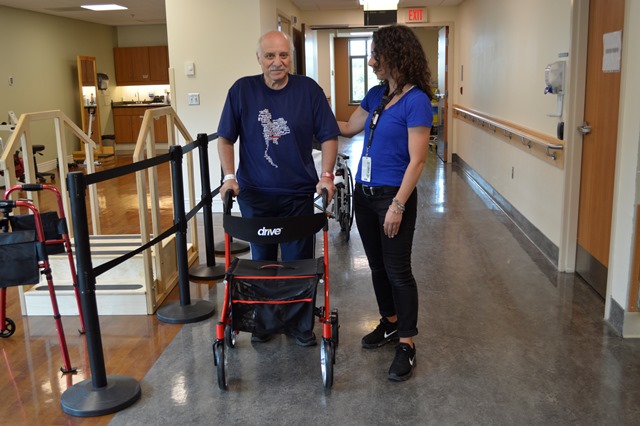
By Carla Wintersgill
Suffering from a lifetime of health problems caused by chemical exposure at a summer job in his youth, David Bergart recently found himself in acute care for four weeks following a stroke that caused him to lose feeling on the left side of his body.
Once stabilized, David was admitted to Runnymede’s Low Tolerance Long Duration Rehabilitation program (also known as slow stream rehab) with the goal of learning to walk again. Fortunately, the hospital had recently undergone an organizational change to help David get back to his life sooner.
Runnymede was proud to introduce a 7-day model of care in February 2019 for its active rehab, slow stream rehab and medically complex programs to maximize the number of therapy minutes patients received per week.
“Runnymede Healthcare Centre put patients’ needs at the centre of all decision-making. We adopt current best practices to help patients achieve their treatment goals and move on to their next care destination or return home,” said Raj Sewda, VP, Clinical Operations & Quality, Chief Nursing Executive & Chief Privacy Officer.
The slow stream rehab program provides patients with a slower, less intense form of therapy. It is designed for patients who are unable to tolerate a more active form of rehabilitation due to their level of disability after injury or surgery. Runnymede’s clinical team works in partnership with patients to restore their mobility and develop the skills and understanding they need to adapt to their new reality and return home. Admission in the program was a boon to David, who had originally been slated for discharge from acute care without additional rehabilitation.
“Without Runnymede I would be sitting at home doing nothing,” David said.
By moving to a 7-day model, slow stream rehab patients receive an increase in therapy minutes per week from 150 to 325 minutes, representing a 116.6% increase. Since the introduction of the 7-day model in February, there has already been a noted reduction in average length of stay for slow stream rehab patients.
“The fact that Runnymede has rehab every single day including weekends is a major part of why I’m walking again,” David said.
David was discharged from Runnymede at the end of June after spending just over a month in the slow stream rehab program. He left walking with the assistance of a wheel walker.
“I met my goal,” David said.
“By introducing the 7-day model, Runnymede is moving more patients faster through our programs, opening up beds in this crucial rehab program and helping to ease the bottleneck in acute care hospitals,” Raj said. “By embracing our rehab philosophy and working together, we are helping more patients get back to their lives, quicker than ever.”
Carla Wintersgill is a communications specialist at Runnymede Healthcare Centre.

